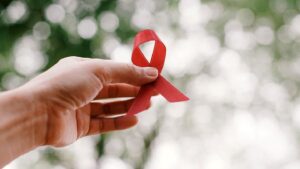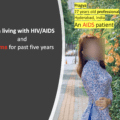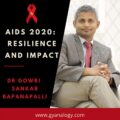To comment or receive more such wisdom, please register on www.gyanalogy.com/login

35 years old Sunita (name changed) belongs to a remote village in Ambedkarnagar district of eastern Uttar Pradesh in India. Her life took a drastic turn four years ago when she was diagnosed to be HIV positive.
When I became HIV positive I did not let anybody know because I feared how my society would regard the circumstances that made me get infected!
Most from her community believe that all HIV positive people are prostitutes or engaged in sex carelessly and that being on medication means one is about to die. They don’t understand the difference between HIV and AIDS.
Sunita's husband deserted her after she tested positive for HIV and her own parents refused to support her. She now lives with her 6 year old daughter in a rented single room and works as a cook in a girl’s hostel to fend for herself.
“The society does not know my HIV status because I have not told them and will not, since they have a negative attitude towards people on ART (Anti retro viral treatment)” she says.
“ I've not taken my medication on occasions when relatives and neighbours were in my house” she admits as she has experienced friends and relatives gossiping and ostracising people living with HIV.
HIV positive people not only experience relational discrimination but also mistreatment by healthcare workers and workplace discrimination.
“Sometimes if you ask healthcare providers something, they don’t respond to your questions. They pretend to be busy and just neglect us. Sometimes they use abusive language against us and then delay giving services.” Sunita narrates her ordeal.
The fear of stigma experienced by people on ART often results in non-adherence to medication through a number of ways. They fear being identified by people who know them, including health staff.
“No, I don’t like the nearby clinic!” Sunita says, “ because many people know me well and can see me. I prefer going to ART clinic that is far away from my home!”
But because of preferring a distant centre, she often fails to attend regularly, partly due to lack of the fare for transport and thereby runs short of ARVs.
“I get comfort from my religion and pray to God everytime I take my medicine. My conscience has agreed to the problem so I regard it as just any other common disease and I believe one day my God will cure me!” Sunita only wishes a good future for her daughter where she can live free from any kind of fear or stigma.
According to the Physician at the District Hospital, Ambedkarnagar, UP (India) “While there have been many advancements in the management of the HIV virus throughout the years, unfortunately a lot of misinformation still exists about what it means to live with HIV”.
He elaborates that people think that HIV is a death sentence and that HIV always leads to AIDS. But the fact is that not all HIV positive individuals will develop AIDS. With current therapies, levels of HIV infection can be controlled and kept low, maintaining a healthy immune system for a long time and therefore preventing opportunistic infection and a diagnosis of AIDS.
People with HIV can live long, productive lives with early detection and adequate anti retroviral treatment.
Also many people think that HIV may spread through casual contact that ultimately leads to ostracising of HIV individuals.
According to him, stigma has been found to be a major barrier to successful HIV prevention, care and treatment.
Following intervention strategies can be undertaken to reduce the stigmatisation of HIV positive individuals:
1.Help the institutions recognize the stigma and discrimination against HIV positive persons.
2.Establish the environment that provides timely, appropriate and humane care for the affected population.
3.Use the media to show that AIDS has a human face.
4.Involve the people with HIV in providing HIV services.
5.Engage the community so that they begin to accept people with HIV.
6.Expand the accessibility and uptake of Anti retroviral therapy (ART).
Start with yourself. There is a lot to be done to end HIV stigma but you can help make a difference Educate yourself and your friends, get the facts about HIV transmission and prevention.
 Contributed by Dr. Gitika Verma – This story was anonymously narrated by a patient to Dr. Verma BDS, MDS (KGMU, Lucknow). Dr. Verma is Dental Consultant at Combined District Hospital, Ambedkarnagar, U.P, India. Besides her medical practice, Dr. Verma writes poetry and loves travelling.
Contributed by Dr. Gitika Verma – This story was anonymously narrated by a patient to Dr. Verma BDS, MDS (KGMU, Lucknow). Dr. Verma is Dental Consultant at Combined District Hospital, Ambedkarnagar, U.P, India. Besides her medical practice, Dr. Verma writes poetry and loves travelling.
The views, thoughts, and opinions expressed in the article belong solely to the author.
To comment or receive more such wisdom, please register on www.gyanalogy.com



